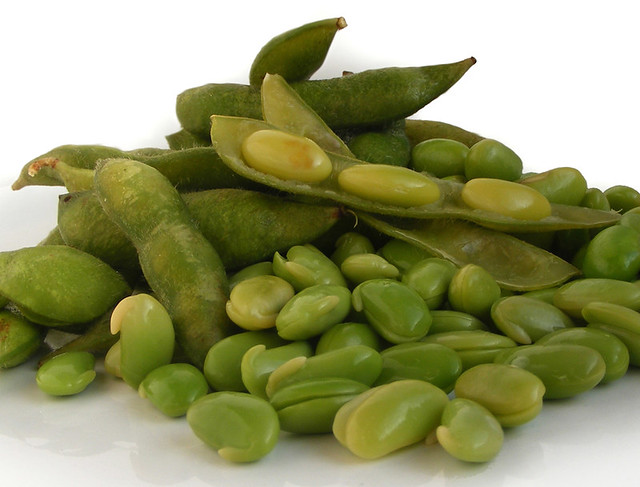
It is almost “common knowledge” now in conventional circles that soy is healthy. After all, it is endorsed by the American Heart Association as healthy. The FDA allows health claims to be made for it on food packaging. “Diets low in saturated fat and cholesterol that include 25 grams of soy protein a day may reduce the risk of heart disease.” They must know what they are talking about. Right?
Sarcasm aside, I was roped in to the “joy of soy” for some years in the 1990′s when I was lecturing that tofu is the perfect food. I also drank a soy based shake every morning because everyone (vitamin companies and the FDA) was saying how good that was for your heart and for hormonal symptoms. I fell for it hook line and sinker.
A good friend of mine was a vegetarian for many years and she substituted soy for animal proteins. She was so “healthy” from all that soy that she couldn’t understand why she was having so many health challenges. There was nothing life threatening, but things ranging from just annoying to life changing. She had chronic inflammation which expressed itself as sinusitis and headaches. That was the annoying aliment. But she also suffered from infertility and wound up going through conventional infertility treatments.
I have seen this story over and over again in my nutrition practice. Ex vegetarians come in ready to make drastic changes due to escalating health problems. Not all is due to soy, but certainly soy is a large part of the vegetarian diet — especially vegan. In combination with the low saturated fat, low cholesterol, high carbohydrate diet that is the essential vegetarian diet, health problems begin to develop. So, in talking about soy, we must make reference to these two diets as well.
In the book The Vegetarian Myth by Lierre Keith, she makes a very strong case against vegetarianism. As an ex vegan of 20 years she is strongly against it as she has experienced significant health problems stemming from the years of nutrient deficiency arising from the vegan diet. She also makes a comprehensive political and moral statement about why it just doesn’t work. If you are interested in this topic, drop everything, buy her book and read it.
Fast forward to today and I’m a staunch advocate against all soy products except small amounts of properly fermented soy made in the traditional way. Proper fermentation results in a probiotic and enzyme rich condiment. To quote Kaayla Danial, soy expert and author of the book, The Whole Soy Story,
The 1999 FDA-approved health claim pleased big business, despite massive evidence showing risks associated with soy, and against the protest of the FDA’s own top scientists. Soy is a $4 billion [U.S.] industry that’s taken these health claims to the bank.
Soybeans originated in the Orient. The soybean was designated as one of the five sacred grains during the Chou Dynasty (1134 – 246 BC). However, evidence shows that it was not eaten, it was used as part of a crop rotation in order to fix nitrogen in the soil.
During the Chou Dynasty the process of fermentation was invented and they fermented the soybean into products such as tempeh, natto, miso and shoyu (soy sauce). These soy products made in the traditional way are considered healthful in small amounts. The Chinese did not eat soybeans in any other way because they knew that there were several harmful substances in them.
Soy is now on the chopping block as study after study after study is beginning to show that the health benefits are just not there, that it may be a risk factor for breast cancer and that it doesn’t help with hot flashes and bone loss in menopause.
Stay tuned for my next post which will elucidate the 7 reasons to avoid soy like the plague.
Resources:
The Whole Soy Story, Kaayla Danial
Photo credit:Photosvanrobin
This post is linked to : Friday Favorites, Fresh Bites Friday, Fight Back Friday, Sugar-Free Sunday, Melt in Mouth Monday, Monday Mania, Mangia Monday, Homemaker Monday. Weekend Carnival, Mouthwatering Monday, Tuesday at the Table, Delectable Tuesday , Tempt my Tummy Tuesday, Tuesday Tasty Tidbits, Tasty Tuesday, Traditional Tuesday, Tasty Tuesday, Tasty Tuesday, Tasty Tuesday, Tasty Tuesday parade of Foods, Slightly Indulgent Tuesday, What’s Cooking Wednesday, Gluten-Free Wednesday, Real Food Wednesday, Healthy 2Day Wednesday, What’s Cooking Wednesday, Foodie Wednesday, What’s Cooking Wednesday, Full Plate Thursday, Creative Juice Thursday